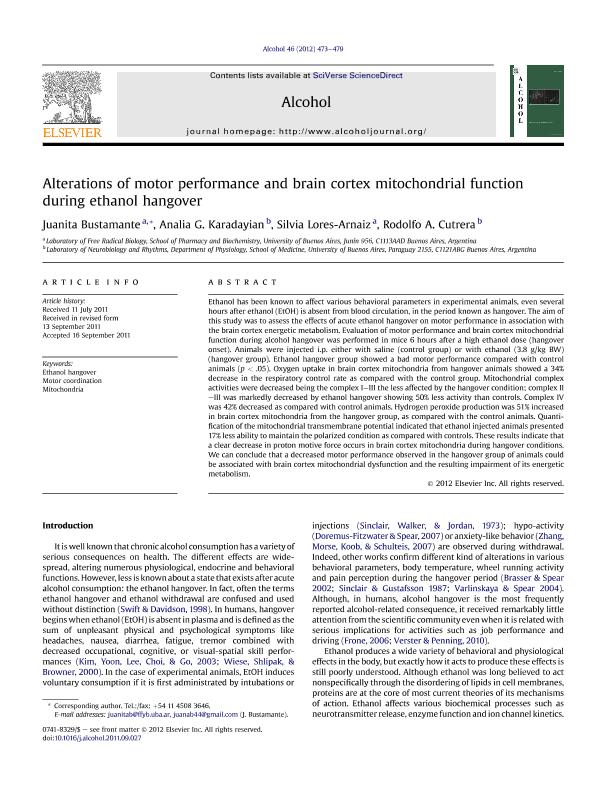Mostrar el registro sencillo del ítem
dc.contributor.author
Bustamante, Juanita
dc.contributor.author
Karadayian, Analia Graciela

dc.contributor.author
Lores Arnaiz, Silvia

dc.contributor.author
Cutrera, Rodolfo Angel

dc.date.available
2023-05-09T15:48:43Z
dc.date.issued
2012-08
dc.identifier.citation
Bustamante, Juanita; Karadayian, Analia Graciela; Lores Arnaiz, Silvia; Cutrera, Rodolfo Angel; Alterations of motor performance and brain cortex mitochondrial function during ethanol hangover; Elsevier Science Inc.; Alcohol; 46; 5; 8-2012; 473-479
dc.identifier.issn
0741-8329
dc.identifier.uri
http://hdl.handle.net/11336/196834
dc.description.abstract
Ethanol has been known to affect various behavioral parameters in experimental animals, even several hours after ethanol (EtOH) is absent from blood circulation, in the period known as hangover. The aim of this study was to assess the effects of acute ethanol hangover on motor performance in association with the brain cortex energetic metabolism. Evaluation of motor performance and brain cortex mitochondrial function during alcohol hangover was performed in mice 6 hours after a high ethanol dose (hangover onset). Animals were injected i.p. either with saline (control group) or with ethanol (3.8 g/kg BW) (hangover group). Ethanol hangover group showed a bad motor performance compared with control animals (p < .05). Oxygen uptake in brain cortex mitochondria from hangover animals showed a 34% decrease in the respiratory control rate as compared with the control group. Mitochondrial complex activities were decreased being the complex I-III the less affected by the hangover condition; complex II-III was markedly decreased by ethanol hangover showing 50% less activity than controls. Complex IVwas 42% decreased as compared with control animals. Hydrogen peroxide production was 51% increased in brain cortex mitochondria from the hangover group, as compared with the control animals. Quantification of the mitochondrial transmembrane potential indicated that ethanol injected animals presented 17% less ability to maintain the polarized condition as compared with controls. These results indicate that a clear decrease in proton motive force occurs in brain cortex mitochondria during hangover conditions. We can conclude that a decreased motor performance observed in the hangover group of animals could be associated with brain cortex mitochondrial dysfunction and the resulting impairment of its energetic metabolism.
dc.format
application/pdf
dc.language.iso
eng
dc.publisher
Elsevier Science Inc.

dc.rights
info:eu-repo/semantics/openAccess
dc.rights.uri
https://creativecommons.org/licenses/by-nc-sa/2.5/ar/
dc.subject
ETHANOL HANGOVER
dc.subject
MITOCHONDRIA
dc.subject
MOTOR COORDINATION
dc.subject.classification
Bioquímica y Biología Molecular

dc.subject.classification
Medicina Básica

dc.subject.classification
CIENCIAS MÉDICAS Y DE LA SALUD

dc.title
Alterations of motor performance and brain cortex mitochondrial function during ethanol hangover
dc.type
info:eu-repo/semantics/article
dc.type
info:ar-repo/semantics/artículo
dc.type
info:eu-repo/semantics/publishedVersion
dc.date.updated
2023-05-09T14:57:29Z
dc.journal.volume
46
dc.journal.number
5
dc.journal.pagination
473-479
dc.journal.pais
Estados Unidos

dc.description.fil
Fil: Bustamante, Juanita. Universidad de Buenos Aires; Argentina
dc.description.fil
Fil: Karadayian, Analia Graciela. Universidad de Buenos Aires. Facultad de Medicina. Departamento de Ciencias Fisiológicas; Argentina. Consejo Nacional de Investigaciones Científicas y Técnicas. Oficina de Coordinación Administrativa Houssay; Argentina
dc.description.fil
Fil: Lores Arnaiz, Silvia. Universidad de Buenos Aires; Argentina. Consejo Nacional de Investigaciones Científicas y Técnicas. Oficina de Coordinación Administrativa Houssay; Argentina
dc.description.fil
Fil: Cutrera, Rodolfo Angel. Consejo Nacional de Investigaciones Científicas y Técnicas. Oficina de Coordinación Administrativa Houssay; Argentina. Universidad de Buenos Aires. Facultad de Medicina. Departamento de Ciencias Fisiológicas; Argentina
dc.journal.title
Alcohol

dc.relation.alternativeid
info:eu-repo/semantics/altIdentifier/url/http://www.sciencedirect.com/science/article/pii/S0741832912000195
dc.relation.alternativeid
info:eu-repo/semantics/altIdentifier/doi/http://dx.doi.org/10.1016/j.alcohol.2011.09.027
Archivos asociados
